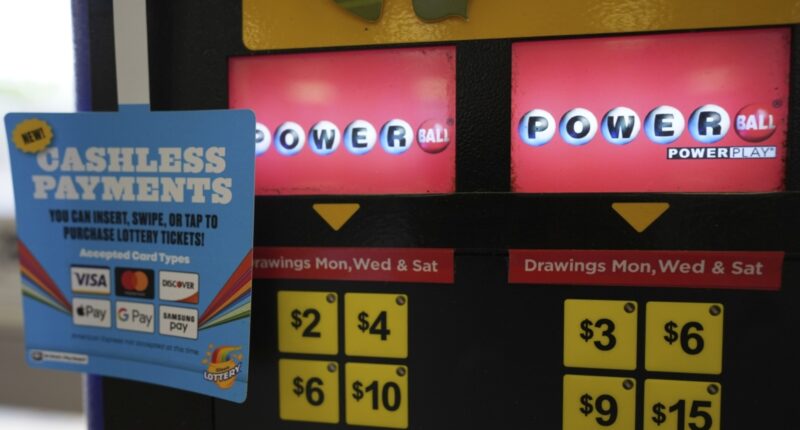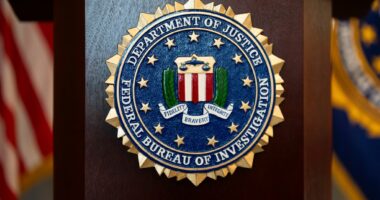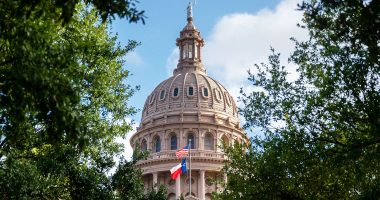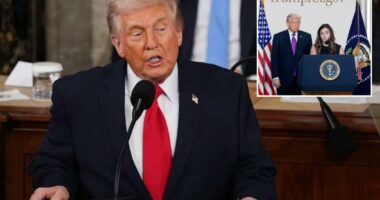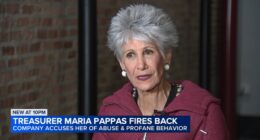Share this @internewscast.com
Lottery players in Missouri and Texas managed to win the massive $1.8 billion Powerball jackpot on Saturday, finishing a streak of three months without a grand prize winner despite the incredibly low odds.
The winning numbers were 11, 23, 44, 61, and 62, with the Powerball number being 17.
Besides the jackpot victors, two additional winners earned $2 million each by matching the five white balls but not the red Powerball, having also chosen the Power Play option for an extra dollar. These tickets were purchased in Kansas and Texas.
A whopping 18 people won $1 million in the Match 5 by matching all five white-ball numbers drawn, but not the red Powerball number.
With this jackpot being the second-highest in U.S. lottery history, it came after 41 straight draws where no ticket matched all six numbers. The previous jackpot win occurred on May 31.
The Powerball is known for its difficult odds of 1 in 292.2 million, which are set to create large jackpots, increasing when the top prize isn’t won. Officials highlight that smaller prizes in the game have much better odds. The game is drawn three times each week.
The coveted $1.8 billion prize would be received through an annuity, consisting of 30 payments over 29 years, should the winner choose this option. Typically, winners opt for the lump-sum cash payout, which was estimated at $826.4 million for this drawing.
Powerball tickets cost $2, and the game is offered in 45 states plus Washington, D.C., Puerto Rico and the U.S. Virgin Islands.
Lotteries have a long history of public disclosure
In the past, revealing the identities of lottery winners was crucial for maintaining the public’s trust in these games.
Lotteries in America date to the 1700s, when governments, like now, used them to raise money. Jonathan D. Cohen, the author of “For a Dollar and a Dream: State Lotteries in Modern America,” said they were born out of a “distinctly American desire for government services without paying taxes for them.”
Early on, they were more like raffles. Winners would be announced at fairs with ticket holders in the audience.
In the 1980s, in some states, Cohen said, people would buy tickets to jackpot games with in-person drawings. About 20 people would stand on stage and one would win. Their emotional personal stories helped fuel the popularity of lotteries.
“Here’s this housewife, here’s this orphan,” Cohen said. “The person who wins the lottery is sitting right there and, of course, immediately starts weeping.”
The big multi-state lotteries like Powerball and Mega Millions, which roll over prize money when no one wins and generate ever-larger jackpots, disrupted that approach, he said. It reduced the human element but allowed for bigger prizes.
Nine states allow all lottery winners to remain completely anonymous for all lotteries. Ten states allow lottery winners to remain anonymous for wins above a certain amount, ranging from $10,000 in Minnesota to $10 million in Virginia.
In some states where there is no anonymity for individual winners, people can still claim prizes anonymously through private trusts.
Attorney Mark K. Harder claimed the $842.4 million jackpot on behalf of a Michigan couple in 2024.
In addition to the security concerns, Harder said the couple wanted to be perceived “the way they had always been perceived.”
Harder said the family also hired a public relations team to vet their social media profiles to make sure they didn’t unintentionally give anything away.
At least one winner has regretted hitting the jackpot
In one well-known case, Andrew “Jack” Whittaker Jr. of West Virginia became an instant celebrity in 2002 when he won a lump sum of $113.4 million after taxes. It was the largest U.S. lottery jackpot won by a single ticket to date.
But he quickly fell victim to scandals, lawsuits and personal setbacks, later saying he wished he had torn up the ticket. He died in 2020.
Cohen said such well-publicized instances are outliers. The vast majority of winners are healthier and wealthier than non-winners, he said.
States, meanwhile, have an interest in disclosing the names to thwart fraud and to boost trust, he said.
“You don’t want the lottery director’s nephew to win every jackpot and just claim it anonymously and nobody knows who it is,” Cohen said.
He noted that states have mechanisms to prevent such subterfuge, like requiring that names of winners be disclosed to their lottery commissions.
The winner of the largest jackpot so far bought his ticket in California, which requires disclosure. Edwin Castro released a written statement after he claimed a 2022 jackpot worth $2.04 billion but declined to speak to reporters.
Last year, a Laotian immigrant and cancer survivor who won a $1.3 billion Powerball jackpot bucked recent trends at a press conference where he hoisted a huge check above his head. Shultz said those stories, along with his own, have value.
“I think it could be really positive, if they want to inspire other people,” he said.
Copyright © 2025 by The Associated Press. All Rights Reserved.
